A little follow up on Tuesday's preview of the documentary film, The Feeling of Being Watched.
It was nice to see a good turnout. Assia Boundaoui showed the first ten minutes of the film, an introduction to the community, Bridgeview, where she grew up, and to their feeling of being watched -- that is, their belief that they as a community were under surveillance for the past thirty plus years.
Before the documentary began, two and a half years ago, this feeling was just that, a feeling, the community had no definitive evidence of any long term FBI operation. Her research and investigation are beginning to tease apart the realities underlying that feeling.
What was public knowledge before she started her film is that in the early 90’s a member of the community was arrested in Israel for giving money to Hamas. This gentleman was later the first American citizen to be declared a terrorist. After his arrest, the predominantly Palestinian American citizenry of Bridgeview were approached in their homes by FBI agents for a series of seemingly unconnected interviews. Besides this obvious aspect of the investigation, the citizens of Bridgeview knew nothing else about the FBI investigation, even whether or not it was an investigation or just a randomized series of interviews. In this atmosphere a feeling of being watched became endemic. Unfamiliar cars became suspicious; visits from the FBI became social embarrassments; unexplained changes to infrastructure, such as boxes on light posts or traffic cameras on stop signs fed personal concern. Thirty years later, many in the neighborhood still suspect they are under surveillance. Interviews with teens growing up in this environment begin to point to the suspicion of, sense of betrayal by, and lack of faith in government that such uncertainty engenders.
The
semi-secret watcher haunts America and much of the world. African
American communities across America have struggled for generations under
such uncertain surveillance, often unsanctioned, such as the KKK, and
often sanctioned, such as police cameras on every block. However, rather
than increased security, across polities where force and asymmetric
surveillance are used trust and safety break down, producing the
opposite of what is held to be desired.
At the heart of 19th century social reformer Jeremy Bentham's fallacious thinking on prison reform was the feeling of being watched, without the actual knowledge of whether or not you were truly being watched. In his design philosophy for a prison, the panopticon, the uncertainty of when a prisoner was or was not being watched led to self-correcting, self-surveilling behavior by the inmates -- uncertainty, paranoia, as the mechanism for controlling behavior through the manipulation of self-doubt and asymmetric power. Thanks to Michel Foucault the idea of modern society as a panopticon is now common.
A primary goal of Assia's investigation is to remove the manipulative uncertainty from Bridgeview citizens’ lives. The film hopes to bring out into the light the feeling of being watched, to examine it and the facts surrounding it; to "start an open conversation in the neighborhood," as Assia said. She observed that initially even getting people in the neighborhood to agree to interviews, especially on camera, was difficult. The film hopes to remove the stigma, paranoia, embarrassment people feel when they are branded untrustworthy, suspect.
Already the filmmakers have achieved some victories for the community. They have established that surveillance started in 01993; that the guilt of the community was presumed from day one with the name Operation Vulgar Betrayal. They have established that despite this presumption of guilt by the FBI, the investigation was shut down in 02000 for producing no results. After 9/11, however, it was revived, and lawyers were assigned the files to review and to produce results. This led to several community members being indicted on mail fraud, tax fraud, and other charges that before had not interested the FBI. After 9/11 a failed surveillance operation was used to weaken and intimidate the community.
The fears of the over reaching state, fears that engender extremism and concern on America's left and right (not to mention in many other polities and groups around the world) are fueled by this secretive, fearful behavior on the part of those with great power. The argument in defense is that the long term harm done is less than the short term benefit and necessity. Although perhaps true in some cases, we have seen again and again that secretive, oppressive policing and security create far more problems than they solve. The use of asymmetric force on the field of citizens' psyches is a symptom of our own fear. Mutually assured destruction is not born solely out of nuclear playbooks, it can also be the result of a breakdown in faith, trust, hope between a citizenry and the people who are held to lead them, the people they trust but who do not trust them.
I encourage our small handful of readers to support this film because in the end it is dialogue, engagement, a rebirth of the feeling of being one nation, a birth of the feeling of being one species, one people, one planet that will serve us best. Suspicion of each other, legislated for security, undermines our security, our nation, and our species. It is not born of wisdom but fear.
You can donate to the making of the second phase of the film here. Having finished their work in the community, the filmmakers are beginning to interview FBI agents and others involved in the surveillance. And they are endeavoring to establish once and for all whether or not the surveillance ever truly ended.


No comments:
Post a Comment